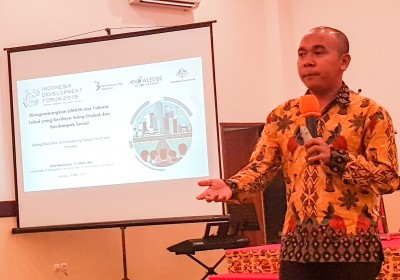Meet the Leader Billy Mambrasar (CEO Kitong Bisa): From Papua to the UK by Selling Cookies
June 27, 2019
Billy Mambrasa on the road to IDF 2019 in Sorong.
Billy Mambrasar, a young man from Yapen Island, Papua, has successfully proven that hard work can change his life. When Billy was little, his neighbourhood had no electricity. Now, Billy can even go to one of the best universities in the world, Oxford University, in England. But success does not make him forget his origin. He long desires all children in Papua to have the same opportunity to learn and innovate, so that they are able to compete in the future.
Billy was born in Yapen, from a father working as an honorary teacher, and a mother restlessly helping his family’s economy by selling cookies. Their economy forced him to help his mother in selling cookies. In fact, this has become his strength to survive, complete his study in his dream university, and now becomes an inspiration for children in Papua and other areas through Kitong Bisa.
“I did not understand why I had to help my mother sell cookies when I was in school. As it turns out, that’s where I started to learn the business. I understand about margin and capital. When I was accepted at Bandung Institute of Technology, I had to sell donuts to survive. I managed to get through that because of what I experienced as a child,” said Billy.
Billy said that his challenging childhood made him continue to dream and strive to change everything. He is grateful to have parents who are very supportive of him to achieve his goals. He gave an example of how his father tried to find money from office to office to buy Billy airfare tickets to enter the admission test at ITB, Bandung. ITB is Billy’s dream university, and where the first Indonesian president, Soekarno, went to college.
In short, he got accepted in the Mining and Oil Faculty. He graduated in 2009 and was accepted to work in an English oil company. At the same year when he experienced his comfort zone, he thought about children in Papua.
“I was looking for ways to help children in Papua. On days off, I began to teach them about home entrepreneurship. It only started with five children,” said Billy.
This concern is based on the high unemployment rate in Papua and West Papua. In Papua, the unemployment rate reaches 3.96 per cent, while in West Papua, it reaches 7.52 per cent. The same goes for high poverty in these two provinces.
“High unemployment in Papua occurs due to a gap in skills possessed by graduates in Papua and West Papua and the requirements from employers. Job availability in Papua is also very limited,” revealed Billy.
Therefore, he thinks that entrepreneurial education is the answer to address this problem in Papua. An entrepreneurial spirit is required for people to survive with all of their power and potential.
Kitong Bisa fosters the entrepreneurial spirit of Papuan children
Billy Mambrasar began his journey for change by establishing a Kitong Bisa Learning Center in Serui, Papua, in 2009. This learning center aimed to inspire Papuan indigenous youth and other minorities to move out of poverty. From Serui, Kitong Bisa expanded its reach across Papua. Starting from 2017, the economic strengthening for Eastern Indonesian Region was conducted through Kitong Bisa Enterprise, social entrepreneurship focusing on education and empowerment, especially for women and youth.
While managing Kitong Bisa, Billy received a full postgraduate scholarship at The Australian National University and is now completing his second master’s degree from Oxford University in England.
“In Papua, many people assume going to school is for obtaining a graduation certificate, and then finding a job. That’s it. In fact, the school must be able to answer a larger need. This is particularly true considering the increasing challenges for the young generation. If we cannot master technology and do not have the spirit for entrepreneurship and innovation, we will be swept away,” said Billy.
Through Kitong Bisa, Papuan children are taught to have an entrepreneurial spirit. The potential of every child is examined and directed to maximize it in order to sell this potential. For example, children who are good in the drawing are directed to make shirt designs to be sold as souvenirs. The education process also uses English as the instructing language, so that children are able to speak and master their English while acquiring lessons in entrepreneurship.
Until now, Kitong Bisa has taught more than 600 children in various regions in Papua. Billy also mentioned that there are at least 72 people among them who have carried out their businesses independently.
“Children are not directed to be entrepreneurs. They can be anything they want. But, whatever they do, entrepreneurial spirit is important. Only with that spirit, they can innovate and have creative ideas wherever they are or work,” said Billy.
Kitong Bisa receives plenty of support from a number of companies for developing learning centres. Currently, there are 13 learning centres, one of which is in Vietnam. Cooperation is undertaken with various institutions within and outside of the country to add to the entrepreneurial curriculum. Entrepreneurship training is also being conducted in many Vocational High Schools (SMKs).
“We hope what Kitong Bisa is doing can be adapted to the formal education, namely by providing entrepreneurial education, which can equip students to increase their competitiveness,” said Billy.
Watch the Meet the Leader Billy Mambrasar video at YouTube IDF!
Indonesia’s Research Institutions Supporting the Development of the Electric Vehicle Industry
Indonesian Muslim Fashion and Cosmetics IKMs Shine at Dubai World Expo 2020
Govt Steps Up UMKM Transformation Efforts in the Midst of Pandemic Slowdown
Govt Encourages Promotion of IKM Products in Digital Era
Government Begins Developing Maritime Training Center in Makassar
Tweets by IDDevForum
